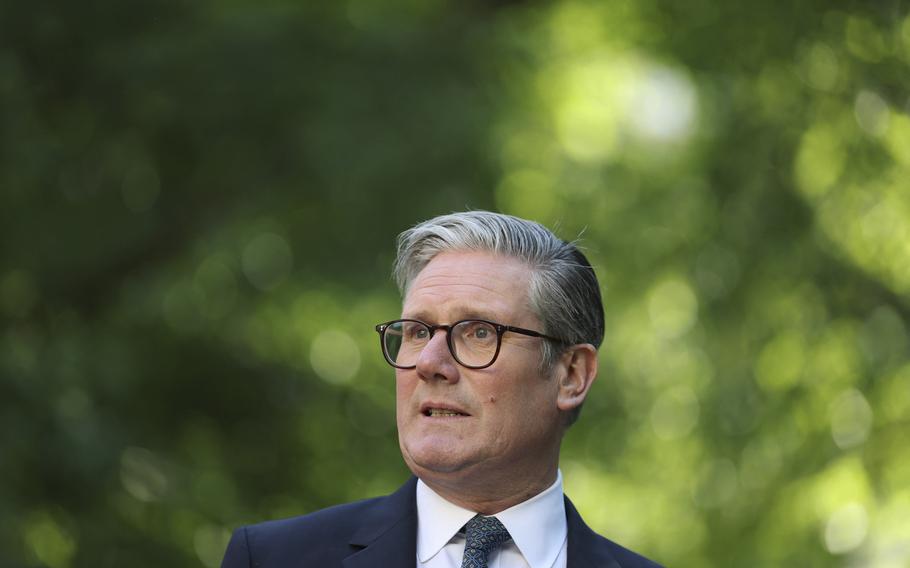
Britain’s Prime Minister Keir Starmer speaks during a reception following the UK-EU summit, in London, Monday May 19, 2025. (Hannah McKay/Pool via AP)
LONDON — The U.K. suspended free trade talks with Israel on Tuesday and hit West Bank settlers with sanctions, less than a day after vowing “concrete actions” if Israel didn’t stop its new military offensive in Gaza.
Pressure from close allies is mounting on Israel following a nearly three-month blockade of supplies into Gaza that led to famine warnings. Even the United States, a staunch ally, has voiced concerns over the hunger crisis.
British Foreign Secretary David Lammy said the government couldn’t continue talks on upgrading its existing trade agreement with an Israeli government pursuing what he called egregious policies in Gaza and the Israeli-occupied West Bank.
“History will judge them,” Lammy said. “Blocking aid. Expanding the war. Dismissing the concerns of your friends and partners. This is indefensible. And it must stop.”
Israeli’s ambassador to the U.K., Tzipi Hotovely, was summoned to the Foreign Office, where Middle East minister Hamish Falconer said he would call the 11-week blockade of aid to Gaza “cruel and indefensible.”
Separately, European Union foreign policy chief Kaja Kallas said the bloc was reviewing an EU pact governing trade ties with Israel over its conduct of the war in Gaza. She said “a huge majority” of member nations are “very keen on sending this message that the suffering of these people is untenable.” She did not provide clear details on timing and mechanisms for review.
‘Utterly intolerable’
Lammy said the U.K. was imposing sanctions on a further “three individuals, two illegal settler outposts and two organizations supporting violence against the Palestinian community.”
He said the illegal Israeli settlements were spreading across the West Bank “with the explicit support of this Israeli government.”
Israel’s Foreign Ministry spokesperson, Oren Marmorstein, called the sanctions against West Bank settlers “unjustified and regrettable” and said the free trade agreement negotiations were not being advanced by the U.K. anyway.
While Lammy’s words were welcomed by some in the House of Commons, others called for stronger action, suggesting economic sanctions against Israel and recognizing the state of Palestine.
A handful of members shouted for him to call Israel’s actions “genocide,” though Lammy labeled it “extremism” and “monstrous.”
Still others criticized the joint statement, saying it favored Hamas.
“Opposing the expansion of a war that has killed thousands of children is not rewarding Hamas,” Lammy said.
The U.K. announcement followed comments by British Prime Minister Keir Starmer, who called children’s suffering in Gaza “utterly intolerable” and repeated his call for a ceasefire.
“I want to put on record today that we’re horrified by the escalation from Israel,” Starmer said.
Starmer calls for ceasefire
On Monday, Starmer joined French President Emmanuel Macron and Canadian Prime Minister Mark Carney in issuing one of the most significant criticisms by close allies of Israel’s handling of the war in Gaza and its actions in the West Bank.
The three leaders threatened to take “concrete actions” if the government of Israeli Prime Minister Benjamin Netanyahu did not cease its renewed military offensive and significantly lift restrictions on humanitarian aid.
Netanyahu called the statement “a huge prize” for Hamas.
Starmer said a ceasefire was the only way to free the dozens of hostages Hamas still holds. He also called for increased shipments of humanitarian aid into Gaza, saying the basic quantity allowed by Israel is “utterly inadequate.”
“This war has gone on for far too long,” Starmer said. “We cannot allow the people of Gaza to starve.”
While Israel allowed a first few trucks with baby food and desperately needed supplies to begin rolling into Gaza on Monday, U.N. humanitarian chief Tom Fletcher described it as a “drop in the ocean of what is urgently needed.” Israel said dozens more trucks entered Tuesday.
Tensions between France and Israel
Israel initially received widespread international support to root out Hamas militants following the group’s surprise attack that killed some 1,200 people, mostly civilians, on Oct. 7, 2023, and took 251 captives.
But patience with Israel is wearing thin after more than 53,000 Palestinian deaths, mostly women and children, according to Gaza’s Health Ministry, which doesn’t differentiate between civilians and combatants in its count. Israel’s latest onslaught has killed more than 300 people in recent days, local health officials said.
In recent weeks, Macron intensified diplomatic efforts to put pressure on Israel, urging a ceasefire and calling for lifting the blockade of humanitarian aid.
Last month, Macron said France should move toward recognizing a Palestinian state, possibly in June when France and Saudi Arabia co-host an international conference about implementing a two-state solution.
Macron, who has said that recognizing Palestine is not a “taboo” for France, last week suggested that revisiting the EU’s cooperation agreements with Israel is on the table.
Tensions between France and Israel have escalated after Macron called for stopping arms deliveries for use in Gaza in an October radio interview, prompting Netanyahu’s criticism. France also sought to impose a ban on Israeli defense companies to prevent them from exhibiting weapons at the Euronaval trade exhibition.
Settler violence
The U.S., France, the EU, the U.K. and Canada previously hit Israeli settlers and settler groups with sanctions for their involvement in violence against Palestinians and in illegal development in the West Bank.
The measures expose the sanctioned people and groups to asset freezes and travel and visa bans. The Associated Press previously reported that these measures have had minimal impact as a deterrent.
Settler attacks causing injury or death to Palestinians have surged since the Hamas attack in 2023. Israel says it opposes settler violence and blames it on an extremist fringe.
Palestinians say the Israeli army does little to protect them and that the attacks are part of a systematic attempt to expel them from their land.
Associated Press writers Natalie Melzer in Nahriya, Israel, and Melanie Lidman in Jerusalem contributed to this report.